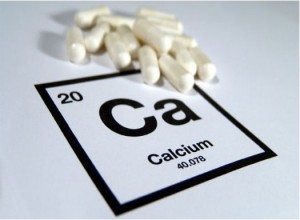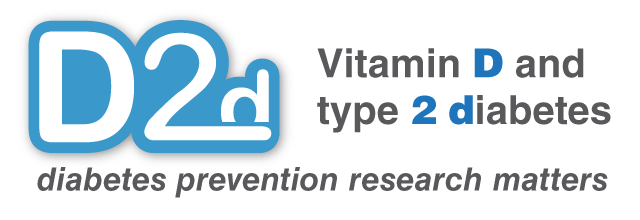Vitamin D and Calcium
Vitamin D and Calcium
 Facts about vitamin D
Facts about vitamin D
Vitamin D is a hormone with many actions throughout the body, the primary one being to promote optimal bone and mineral metabolism. Humans have evolved to make vitamin D in the skin upon exposure to sunlight. Vitamin D is also found naturally in foods (e.g. salmon, eggs) but in small amounts. Most of the vitamin D in the diet comes from foods fortified with vitamin D (e.g. milk). The Recommended Daily Allowance (RDA) for vitamin D is 600 IU per day for adults up through the age of 70 years, and 800 IU per day for older adults. Because of today’s lifestyle, which is associated with limited exposure to natural sunlight, people make less vitamin D than in the past. Recent observational studies have suggested that a low vitamin D level in the blood is associated with development of many chronic diseases, including type 2 diabetes; however, according to reports by the Institute of Medicine and the Endocrine Society, the evidence to support vitamin D supplementation for chronic conditions, such as diabetes, does not currently exist and definitive studies are needed to determine whether vitamin D has a role in diabetes prevention. The D2d study is such a study and it is expected to provide very important information on the role of vitamin D in diabetes prevention. The results from this study could have major public health implications.
D2d participants who take large amounts of supplemental vitamin D outside of the D2d study reduce the ability of the study to detect any benefits and may also put themselves at risk for side effects. Therefore, the D2d study asks participants to follow current recommendations for vitamin D intake for healthy people (600 or 800 IU per day depending on age); however, the study allows intake of vitamin D from supplements up to 1000 IU per day if participants and their physicians wish to do so. For more information about vitamin D, please read Vitamin D QuickFacts developed by the National Institutes of Health Office of Dietary Supplements.
 Facts about calcium
Facts about calcium
Calcium is essential for healthy bones and for many normal cell functions. The Recommended Daily Allowance (RDA) for calcium is 1000-1200 mg per day for adults. Although it is important to consume the RDA, increasing intake above this level – especially from supplements – is unwise because doing so adds no known benefit and may increase risk of kidney stones and possibly other chronic diseases, such as heart disease. Importantly, there has been no concern with calcium from food sources, and thus the preferred approach of meeting the RDA is with consumption of with foods and beverages rich in calcium (such as low fat and skim milk and yogurts). Over the last few years, calcium intake from food sources has increased in American diets and now averages about 750 to 850 mg per day for men and 900 to 1200 mg per day for women. The majority of dietary calcium comes from dairy sources.
Based on available facts, the D2d study recommends that participants meet their calcium requirement from dietary sources and the study limits use of calcium supplements to no more than 600 mg per day because: (1) when combined with the calcium in foods, most adults will be at or near the recommended amount, (2) excess supplemental calcium, particularly if combined with vitamin D supplements, may increase risk of a high blood calcium level or kidney stones. For more information about calcium, please read Calcium QuickFacts developed by the National Institutes of Health Office of Dietary Supplements.

